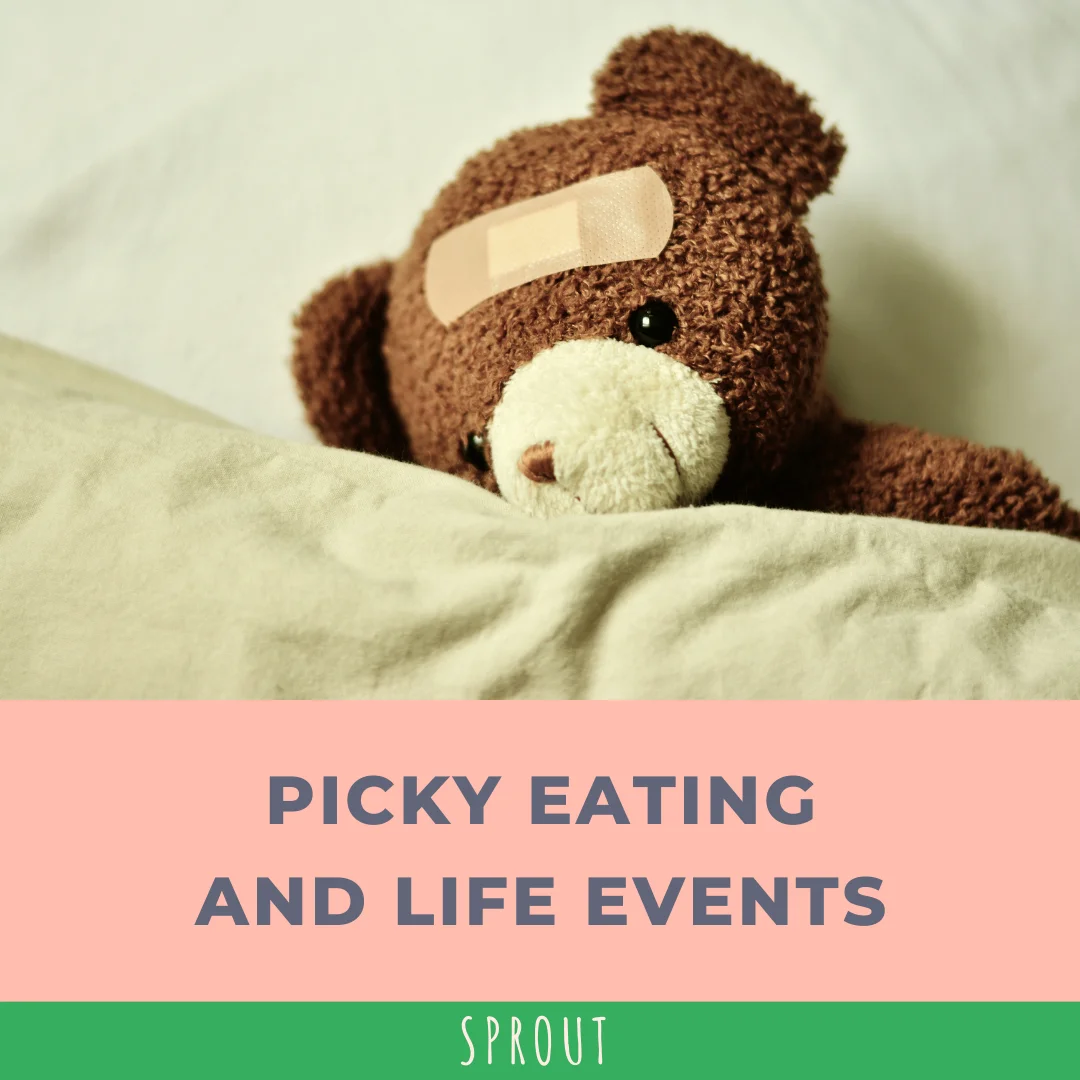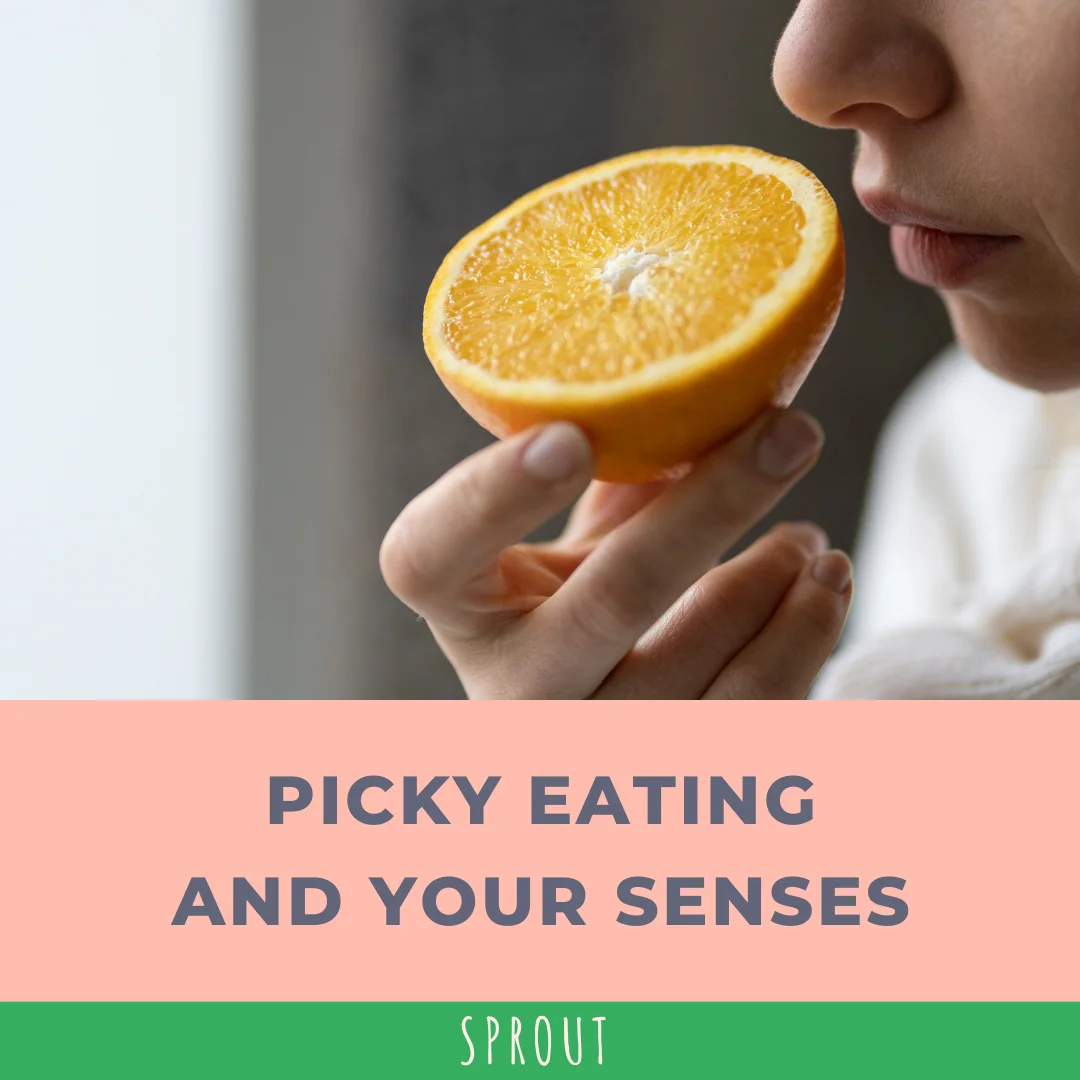Introduction, is picky eating bad behaviour?
When your little one is saying “it’s yucky!” yet again, and throwing their food on the floor, it really can feel like they’re winding you up! Coupled with comments and eye-rolls from other people you may start to wonder… “is this picky eating bad behaviour?”.
It’s a common belief that fussy eating is just a “discipline” issue or a “bad behaviour”. But here at Sprout, we really don’t think that’s the case! There are usually genuine reasons behind fussy eating and your child is not just trying to be naughty.
Where this “bad behaviour” idea comes from
Many of us have been led to buy into the idea of “good behaviour” and “bad behaviour”. This probably all began with a well known field of psychology called “behaviourism” which, to put it very simply, stated that children are born as a blank canvas and the way they behave is shaped through a series of rewards (or positive experiences) and punishments (or negative experiences).
This idea made its way into popular parenting, and it makes sense - reward “good behaviours” that you want to continue, and punish “bad behaviours” that you want to reduce. But what happens when children are genuinely finding eating hard because of the way their body works and this is labelled as “bad”?
What the research shows
Research studies highlight that parents often think about picky eating as “bad behaviour” and they use words like defiant when describing their child’s eating habits. One interview study with 6-10 year olds suggests that this belief is passed down to children who also talk about their eating habits in these terms.
Children likely conceptualise their eating decisions as bad behaviour due to the way it is responded to - for instance one participant described being sent to his room for not eating his dinner. Here we see this “behaviourism” theory in action! The problem here, is that this can quickly evolve into feelings of shame about not being able to eat certain foods.
Viewing picky eating as “bad behaviour” may contribute to feelings of shame
When fussy eating is viewed as “bad behaviour” it’s easy for children to develop feelings of shame about their eating, when in actual fact children are always trying their best with the skills that they have, and the circumstances they are in!
Children may think, “If I choose not to eat that, am I bad!?”. These feelings may lead them to believe they are just not good enough, and eating is too difficult, further reducing their motivation and curiosity to develop their eating skills.
What children really want is for food to fill them up and feel comfortable in their body. When eating certain foods or quantities is framed as “good behaviour” and eating other foods or quantities is framed as “bad behaviour” kids can experience tension between what feels comfortable in their body, and what other people so clearly expect of them.
Deciding whether to listen to their body or obey orders from the outside world can add a lot of stress to eating!!
Changing our thinking
Let’s think about it - if a child was having difficulty learning to walk, we would probably investigate if there’s a physical or developmental reason for that - not just put it down to “bad behaviour” or “not trying hard enough”.
Similarly, if a child is having difficulty pronouncing certain sounds or words we would be unlikely to think “oh, they’re being naughty and manipulative!”. So, it’s the same with eating, and we need a big mindset shift here! Instead of viewing picky eating as bad behaviour, let’s start to see picky eating as communication.
Fussy eating is communication
What are children communicating? When children are refusing food they are not trying to be naughty. They are trying to tell us something that may be very difficult to verbalise in words.
They may not be able to tell you why they like certain foods, or dislike
others and often it’s not a rational or a logical thing from an adults point
of view. It can change day to day, or even meal to meal and it seems there
is no rhyme or reason! However, refusing food is usually a sign that
something is not quite right. Perhaps:
- The food is unfamiliar (and therefore scary!)
- I’m just not hungry
- Eating is uncomfortable (or even painful!)
- I’m struggling to manage the food in my mouth
- There’s something not quite right inside (perhaps constipation or a tummy ache?)
- I’m trying to meet an unmet need!
Meeting needs
You can think of your child as having many needs - or cups that need to be filled. When these cups are full - your child is thriving! When these cups are empty, or running low, your child may be struggling and need a top up! Some of these needs include:
- Feeling in control
- Feeling able and successful
- Feeling connected with others, included, and a sense that they belong
- Feeling accepted and loved exactly as they are
- Feeling full & satisfied
- Feeling relaxed, regulated & having time to unwind
- Feeling safe
So, for example, if your child is begging for snacks all afternoon, they may not be being “annoying” or “manipulative” they may just be trying to meet their need to feel full - perhaps they didn’t manage to eat much at lunch time.
Similarly, if they are pushing the food away or turning their head away from the spoon - they are not being “rude” but may instead be trying to feel safe. If your little one is insisting that you present the food a particular way, or on a particular plate they may be trying to meet their need of autonomy, or feeling in control.
Conclusion
To sum up, seeing our child’s food refusal as “bad behaviour” can lead us to try strategies like rewards or sanctions - further fueling the idea that eating in a certain way is “good” and eating another way is “bad” - potentially leading to feelings of shame around eating.
Instead, we can start to see eating preferences and behaviours as a form of communication. Let’s listen to what children are telling us with their actions - eating may be uncomfortable, or one of their “cups” may be running low.
References:
Cormack, J., Rowell, K., & Postăvaru, G. I. (2020). Self-determination theory as a theoretical framework for a responsive approach to child feeding. Journal of Nutrition Education and Behavior, 52(6), 646-651.
Walton, K., Kuczynski, L., Haycraft, E., Breen, A., & Haines, J. (2017). Time to re-think picky eating?: a relational approach to understanding picky eating. International Journal of Behavioral Nutrition and Physical Activity , 14, 1-8.
Wolstenholme, H., Kelly, C., & Heary, C. (2022). ‘Fussy eating’ and feeding dynamics: School children's perceptions, experiences, and strategies. Appetite, 173, 106000.

